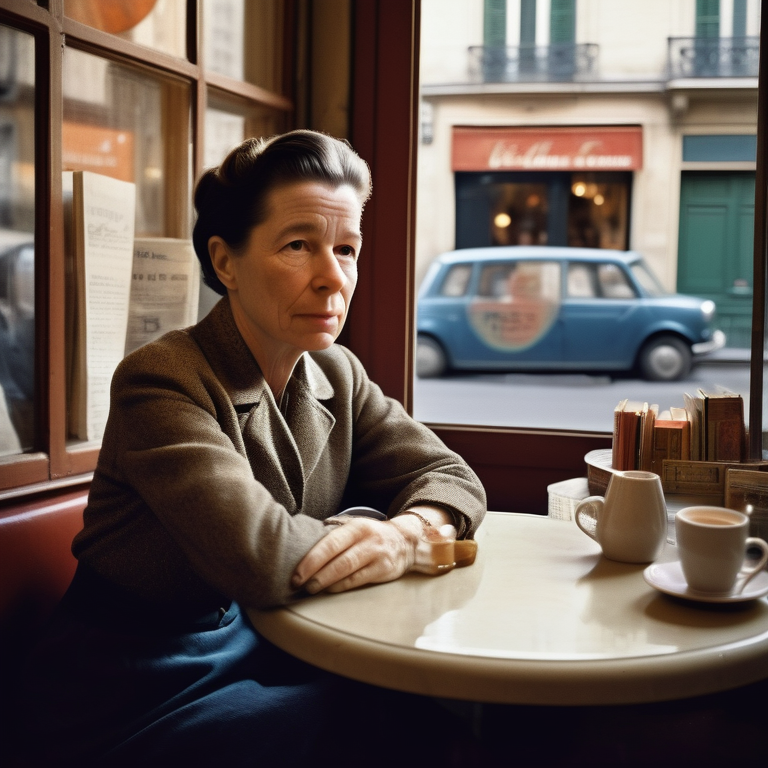11 Must-Read Contemporary Works on Female Sexuality

Key Highlights
- Contemporary literature offers a reflection of the present values and beliefs of society, making it important for understanding the modern world.
- These 11 essential contemporary works on female sexuality provide a diverse range of perspectives on the topic.
- The intersection of female sexuality and society is a central theme in these works, exploring societal norms, empowerment, and the feminist movement.
- These works contribute to the feminist movement by challenging societal perceptions, promoting empowerment, and sparking important conversations.
- Contemporary literature has the power to change societal perceptions of female sexuality by presenting alternative narratives and challenging traditional norms.
- Readers looking for more works on similar topics can explore contemporary literature through online browsing, bookstores, and libraries.
Introduction
Contemporary literature is a powerful platform for exploring and understanding the complexities of the modern world. It reflects the present values and beliefs of society, providing a lens through which we can examine and analyze our own lives and the world around us. In the context of female sexuality, contemporary literature has played a crucial role in amplifying diverse voices, challenging societal norms, and empowering women. Various types of contemporary literature address the topic of female sexuality, including novels, poetry, essays, and memoirs. These works offer unique perspectives and insights into the experiences of women and their sexuality in today’s society and the time period in which they were written, shedding light on the realities of everyday life for women. One genre that has been particularly impactful in exploring female sexuality is science fiction, with works such as Octavia Butler’s “Lilith’s Brood” and Margaret Atwood’s “The Handmaid’s Tale” delving into themes of gender, power, and sexuality in futuristic worlds.
Female sexuality has always been a topic of interest and intrigue, often shrouded in stigma and societal expectations. However, contemporary works on female sexuality have emerged as a powerful force, seeking to normalize and celebrate the diversity and complexity of female sexual experiences. These works delve into themes of empowerment, identity, and the intersections of gender and society.
In this blog, we will explore 11 essential contemporary works on female sexuality that have made a significant impact in the literary world. From exploring the beauty myth in modern society to reclaiming the word “cunt” as an act of empowerment, these books offer a range of perspectives and stories that challenge traditional narratives and shed light on the experiences of women in today’s world.
11 Essential Contemporary Works on Female Sexuality
Here are 11 essential contemporary works on female sexuality that every reader should explore. These books provide thought-provoking insights into the complexities of female sexuality, challenging societal norms and offering empowering narratives:
1. The Beauty Myth by Naomi Wolf
“The Beauty Myth” by Naomi Wolf is a groundbreaking book that explores the ways in which beauty standards and societal expectations impact women in modern society. Wolf argues that the beauty myth is a powerful force that restricts and oppresses women, perpetuating harmful stereotypes and undermining their autonomy. This influential work has had a profound impact on feminist discourse and continues to be relevant in today’s society, particularly in the United States.
2. Women Who Run with the Wolves by Clarissa Pinkola Estés
“Women Who Run with the Wolves” by Clarissa Pinkola Estés is a powerful exploration of feminine power and empowerment. Through a collection of myths, folktales, and stories, Estés delves into the depths of the female psyche, reclaiming and celebrating the wild and untamed aspects of womanhood. This book offers a transformative journey for readers, encouraging them to embrace their own inner strength and wisdom.
- Explores the power of storytelling as a means of empowerment and self-discovery
- Challenges societal expectations and norms surrounding femininity and sexuality
- Celebrates the wild and untamed aspects of feminine energy
- Offers insights and guidance for women seeking to reclaim their power and authenticity
- Provides a rich tapestry of myth and folklore from various cultures, highlighting the universality of female experience
3. The Second Sex by Simone de Beauvoir
“The Second Sex” by Simone de Beauvoir is a seminal work in feminist literature. It explores the concept of womanhood and how women have been historically oppressed and marginalized. De Beauvoir argues that women have been defined and confined by their relationship to men, and she calls for women to reject these societal expectations and claim their agency and independence. This groundbreaking book remains a cornerstone of feminist theory and continues to inspire readers to question and challenge gender norms.
4. Sexual Politics by Kate Millett
“Sexual Politics” by Kate Millett is a landmark work in feminist literary criticism. Published in the 20th century, this book explores how gender and power intersect in literature and society. Millett examines various works of literature, from classic texts to contemporary novels, to uncover the underlying power dynamics and gender biases. This critical analysis offers valuable insights into the representation of female sexuality in literature and how it reflects and perpetuates societal norms. “Sexual Politics” remains a significant contribution to the feminist movement, challenging readers to question and critique the patriarchal structures that shape our understanding of female sexuality.
5. Gender Trouble by Judith Butler
“Gender Trouble” by Judith Butler is a groundbreaking book that has had a profound impact on gender studies and feminist theory. In this work, Butler challenges the traditional understanding of gender as a fixed binary, arguing that it is a performative and fluid concept. She explores how gender identity is constructed and maintained through social and cultural norms. “Gender Trouble” offers a critical analysis of the intersection of gender and sexuality, questioning the very foundations of our understanding of these concepts. This book continues to be highly influential in contemporary discourse surrounding gender identity and the fluidity of sexuality.
6. The Purity Myth by Jessica Valenti
“The Purity Myth” by Jessica Valenti is a thought-provoking exploration of the societal obsession with female purity and its impact on women’s lives. Valenti challenges the prevailing narrative that equates a woman’s worth with her sexual purity, arguing that this myth perpetuates harmful ideas about female sexuality and reinforces patriarchal control. This book sheds light on how societal norms and expectations shape our understanding of female sexuality and the harmful consequences these norms can have on women’s lives. “The Purity Myth” is an important contribution to the feminist movement, urging readers to question and challenge the harmful ideas surrounding female purity.
7. Cunt: A Declaration of Independence by Inga Muscio
“Cunt: A Declaration of Independence” by Inga Muscio is a provocative and empowering book that seeks to reclaim and redefine the word “cunt” as an act of empowerment. Muscio challenges the cultural taboo surrounding the word and encourages readers to embrace their sexuality and reclaim their bodies. This book offers a bold and unapologetic exploration of female sexuality, challenging societal norms and expectations. “Cunt” is a powerful call to action for women to embrace their own sexual agency and reclaim their bodies from the oppressive forces of patriarchy.
8. The Vagina Monologues by Eve Ensler
“The Vagina Monologues” by Eve Ensler is a groundbreaking play that celebrates and explores female sexuality through a series of monologues. This play brings to light the experiences, desires, and challenges faced by women around the world, offering a diverse and inclusive representation of female sexuality. Through a combination of humour, vulnerability, and empowerment, “The Vagina Monologues” challenges societal taboos and encourages open and honest conversations about female sexuality. The play has become a global phenomenon, inspiring performances and discussions that continue to shed light on the experiences of women in the modern era.
9. Female Chauvinist Pigs by Ariel Levy
“Female Chauvinist Pigs” by Ariel Levy is a thought-provoking exploration of how women have internalized and perpetuated patriarchal ideals of sexuality. Levy examines the rise of raunch culture, where women are encouraged to objectify themselves and compete for the male gaze. This book challenges the notion that sexual liberation means conforming to hypersexualized stereotypes, and instead advocates for a more nuanced and empowering understanding of female sexuality. “Female Chauvinist Pigs” raises important questions about the impact of popular culture on our understanding of gender roles and how women can reclaim their sexual agency.
10. Living a Feminist Life by Sara Ahmed
“Living a Feminist Life” by Sara Ahmed offers a powerful and personal exploration of feminist theory and practice. Ahmed challenges readers to examine their own complicity in perpetuating oppressive systems and offers practical strategies for living a feminist life. This book delves into the intersections of gender, race, and sexuality, highlighting how these social categories shape our experiences and identities. “Living a Feminist Life” provides a critical analysis of the feminist movement and offers a roadmap for building a more inclusive and equitable society. This book is an essential read for anyone interested in understanding and dismantling the systems of power that perpetuate inequality.
11. Hood Feminism: Notes from the Women That a Movement Forgot by Mikki Kendall
“Hood Feminism: Notes from the Women That a Movement Forgot” by Mikki Kendall is a powerful and necessary exploration of how mainstream feminism has often neglected the experiences and concerns of marginalized women. Kendall calls for a more inclusive and intersectional approach to feminism, one that addresses issues such as poverty, violence, and healthcare access. This book challenges readers to consider their own biases and blind spots and to work towards a more inclusive and equitable feminist movement. “Hood Feminism” is a call to action, urging readers to amplify the voices of marginalized women and work towards a more just and inclusive society.
Expanding on Female Sexuality in Literature
Contemporary literature offers a rich and diverse exploration of female sexuality, with authors tackling the topic from various angles and through different genres. From prose to poetry and everything in between, contemporary authors are pushing the boundaries of traditional narratives and offering fresh perspectives on female sexuality. English literature has seen a surge in works that challenge societal norms and empower women to embrace their sexual agency, including short stories. These works contribute to a broader understanding of female sexuality and the complexities that surround it in the current day.
The Evolution of Female Sexuality Themes in Literature
The themes surrounding female sexuality in literature have evolved over time, reflecting the changing cultural attitudes towards women and their bodies. In earlier periods, female sexuality was often depicted as mysterious and dangerous, with women’s desires and agency suppressed. However, contemporary literature has challenged these narratives, offering a more nuanced and empowering portrayal of female sexuality. These works explore themes of sexual liberation, consent, and the diversity of sexual experiences. The writing style has also evolved, with authors experimenting with different narrative techniques and voices to capture the complexity of female sexuality. From poetic prose to stream-of-consciousness narratives, contemporary authors are pushing the boundaries of traditional storytelling to present a more authentic and inclusive representation of female sexuality.
How Contemporary Authors Are Shaping the Conversation
Contemporary authors play a crucial role in shaping the conversation around female sexuality. Writers such as Margaret Atwood and Kazuo Ishiguro have explored the topic in their works, offering unique perspectives and challenging societal norms. Atwood’s “The Handmaid’s Tale” and Ishiguro’s “Never Let Me Go” delve into themes of sexuality, power, and agency, prompting readers to reflect on the role of gender in society. These authors use their storytelling prowess to spark important conversations and challenge readers to question the status quo. By using their platform to amplify marginalized voices and shed light on the complexities of female sexuality, contemporary authors are contributing to a broader understanding and acceptance of diverse sexual experiences.
The Intersection of Female Sexuality and Society
The intersection of female sexuality and society is a central theme in contemporary literature. These works explore how societal norms and expectations shape female sexual identity, often reinforcing patriarchal power structures. By challenging these norms and offering alternative narratives, contemporary authors are shedding light on the impact of societal expectations on women’s lives. These works also celebrate female sexual empowerment, offering stories of resistance and self-discovery. Through their exploration of the intersection of female sexuality and society, contemporary authors are contributing to a broader conversation about gender, power, and equality.
The Role of Society in Shaping Female Sexual Identity
Society plays a significant role in shaping female sexual identity, with cultural norms and expectations often dictating how women should express their sexuality. These societal pressures can lead to the internalization of harmful stereotypes and the suppression of authentic desires. Contemporary literature explores the impact of societal norms on female sexual identity, offering narratives that challenge these expectations and encourage women to embrace their own unique desires and experiences. By shedding light on the ways in which societal norms shape female sexual identity, these works contribute to a broader conversation about gender, power, and self-determination.
Overcoming Societal Norms: Stories of Empowerment
Contemporary literature offers stories of empowerment, highlighting how women navigate societal norms and expectations to embrace their sexual agency. These works challenge the idea that women should conform to narrow conventions of beauty and behaviour, instead celebrating their individuality and autonomy. By showcasing stories of empowerment in the postmodern era, contemporary literature, specifically postmodern literature, inspires readers to question and challenge societal norms, opening up possibilities for self-discovery and growth. These narratives provide a powerful counterbalance to the pressures and expectations placed on women, offering stories of resilience, agency, and self-acceptance.
Critical Analysis and Reviews
Critical analysis and reviews of contemporary works on female sexuality provide valuable insights and perspectives on these important literary contributions. Through critical analysis, readers can delve deeper into the themes, writing style, and societal implications of these works. Reviews offer readers the opportunity to hear different perspectives and opinions, helping them make informed decisions about which books to explore. By engaging with critical analysis and reviews, readers can gain a broader understanding of the impact and significance of these works, and contribute to the ongoing conversation surrounding female sexuality in literature.
Diving Deeper into “The Beauty Myth”
“The Beauty Myth” by Naomi Wolf is a book that warrants deeper analysis due to its profound impact on modern society. Critical analysis of this work can examine how beauty standards and societal expectations shape women’s lives, drawing connections to contemporary issues and debates surrounding body image, self-esteem, and feminism. By critically engaging with “The Beauty Myth,” readers can gain a deeper understanding of the cultural forces at play and how women’s bodies are commodified and controlled. This critical analysis can also shed light on how “The Beauty Myth” has influenced and shaped feminist discourse since its publication.
Exploring the Wilderness in “Women Who Run with the Wolves”
“Women Who Run with the Wolves” by Clarissa Pinkola Estés offers a rich and poetic exploration of female empowerment and self-discovery. Through critical analysis, readers can delve deeper into the themes of wildness, intuition, and reclaiming one’s authentic self. This work resonates with readers who seek to embrace their inner wildness and challenge societal expectations and limitations. By exploring the wilderness within, readers can find empowerment and inspiration to live authentically and embrace their unique journeys. Critical analysis of “Women Who Run with the Wolves” can further illuminate the transformative power of this book and its impact on readers’ lives.
Conclusion
Exploring contemporary works on female sexuality is not just about reading; it’s about understanding the evolution of societal norms and empowering narratives. These essential reads delve into the intersection of female sexuality and society, shaping conversations that challenge conventions. By critically analyzing these works, we uncover powerful themes of empowerment and identity. As literature continues to redefine female sexuality, it’s crucial to embrace these diverse perspectives for a more inclusive future. Share these insightful works on social media and ignite discussions that celebrate female empowerment and liberation.
Frequently Asked Questions
Why is it important to read contemporary works on female sexuality?
It is important to read contemporary works on female sexuality because they offer diverse perspectives and challenge societal norms. These books promote empowerment, spark important conversations, and contribute to the feminist movement by amplifying marginalized voices and questioning the status quo.
How do these works contribute to the feminist movement?
These works contribute to the feminist movement by challenging societal norms and expectations surrounding female sexuality. They amplify marginalized voices, promote empowerment, and inspire readers to question and challenge patriarchal power structures. Through their exploration of female sexuality, these books spark important conversations and contribute to a broader understanding of gender equality.
Can literature change societal perceptions of female sexuality?
Yes, literature has the power to change societal perceptions of female sexuality. By presenting alternative narratives and challenging traditional norms, contemporary works on female sexuality can broaden perspectives and promote a more inclusive and accepting understanding of female desire and agency.
Where can I find more works on similar topics?
To find more works on similar topics, you can explore contemporary literature through online browsing, bookstores, and libraries. Websites and online platforms dedicated to literature can provide recommendations and reviews. Additionally, exploring English literature from different countries, such as India, can offer unique perspectives and diverse narratives on female sexuality.





